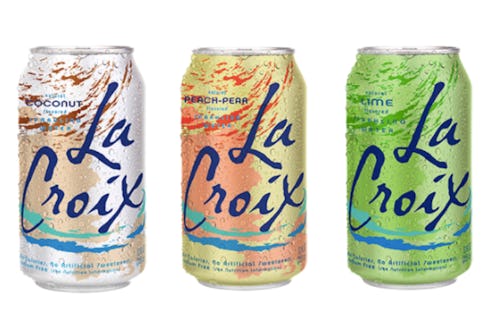If you love you some LaCroix, you probably don't spend much time contemplating why you're so obsessed with now-iconic sparkling water. All you know is that it's a must have, and that it's basically a little bit of sparkling heaven in a can. Maybe it's time to find out what's in LaCroix that gives it the extremely light flavor you've come to expect after cracking open a can of pure summertime.
No matter what flavor your go-to is — pamplemousse? Key Lime? The ever-controversial coconut? — you know you're drinking a LaCroix because the flavor is so profoundly... subtle. As in, it doesn't have enough taste to throw off your meal, but it has enough flavor to intrigue your palate amid the bubbles of carbonation. As one all-time favorite tweet of mine puts it, the sparkling water tastes as if you were drinking it, and then "someone screamed out loud the name of a specific fruit in the other room." LaCroix is kind of a millennial version of Proust's madeleines — a humble, unassuming taste that nonetheless evokes a simpler time, or, in this case, a fruit.
So we, of course, know at this point that the main ingredient of LaCroix is water — that's what makes the canned drink so refreshing. But what gives it its distinct flavor?
Ready to find out what, exactly, makes LaCroix taste like LaCroix? The answer is essence. Yes, that's right. Many of your fave LaCroix flavors are described as containing essence oils, which are apparently a real thing. "Essence is our picture word," LaCroix spokesman Rod Liddle told the Wall Street Journal in 2017. "Essence is—FEELINGS and Sensory Effects! Hope this answers your inquiry." No, Mr. Liddle, it does not. But, I actually don't care because that essence is so damn satisfying.
Dictionary.com has several definitions of "essence," one of them being: "a substance obtained from a plant, drug, or the like, by distillation, infusion, etc., and containing its characteristic properties in concentrated form." While this might make their explanation a little more clear, LaCroix is still keeping the actual essence of its sparklers super top secret. If you want to get philosophical about it, essence is also defined as: "the inward nature, true substance, or constitution of anything, as opposed to what is accidental, phenomenal, illusory, etc.," and "something that exists, especially a spiritual or immaterial entity." If you go by these definitions, saying that LaCroix is made of essence makes complete sense.
What's more, according to the Wall Street Journal, the U.S. Food and Drug Administration noted that essence can be used to describe "flavoring constituents derived from a spice, fruit or fruit juice, vegetable or vegetable juice, edible yeast, herb, bark, bud, root, leaf or similar plant material, meat, seafood, poultry, eggs, dairy products, or fermentation products thereof." Using the FDA guidelines, your LaCroix likely contains the essence of one of the above. On its website, LaCroix claims their all-natural flavors come from "essences or oils derived from the named fruit, i.e., lime / lime oils." So, there you go.
The Wall Street Journal asked LaCroix drinkers how they thought this magical essence is made, and people came up with some interesting answers. "Essence is fairies in a warehouse somewhere dancing with fruits, and suddenly you have this amazing drink," LaCroix lover Miranda Wicker told the newspaper. Whether Tinker Bell and her squad are busy dancing with fruit to extract its essence, or LaCroix makes the fruit go to a rigorous SoulCycle class and then uses its sweat to create this essential essence, it sounds like there is actually no fruit in your wonderful water, just the essence of said fruit.
Hey, that's totally OK with LaCroix lovers. Devotees embrace this water because it's the exact opposite of too much. It's just enough. Just because you can put an entire fruit tree in a can doesn't mean you should. The essence of that fruit will do just fine. And, if we want more essence we'll just drink another can. Because, essence is: "the basic, real, and invariable nature of a thing or its significant individual feature or features." And, that's good enough for me." Or, as Wicker put it, "There are just some things we don’t need to know."
